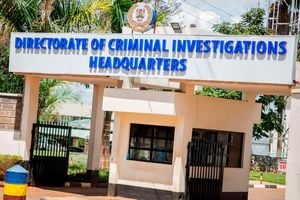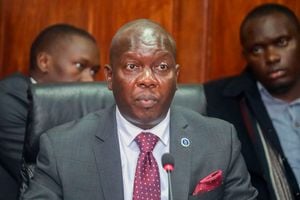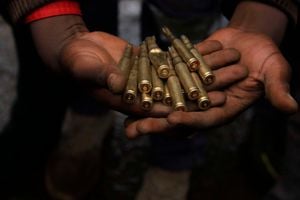
Ann Wanjira holds a portrait picture of her late son Evans Kiratu, Ibrahim Wanjiku Kamau, Charles Owino and Kevin Odhiambo. Background: Edith Wanjiku (left) and a friend react at City Mortuary in Nairobi on June 26, 2024, after viewing the body of her son Ibrahim Kamau.
A parliamentary committee has given the Independent Police Oversight Authority (IPOA) two weeks to provide details of the 50 people killed during the anti-government protest failure to which they will recommend to the House a formation of commission of inquiry.
The National Assembly Constitutional Implementation and Oversight Committee (CIOC) has asked IPOA to provide and publish in-depth details about its investigations on the 50 deaths it recorded during the anti-government protests.
The committee chairperson Gathoni Wamuchomba said should the authority fail to provide those details then, the committee will have no choice but to recommend to the whole House for a commission of inquiry.
“If we don’t get the substantive report, this committee will request the House that we form a commission of inquiry to investigate the deaths of innocent Kenyans,” said Ms Wamuchomba.
“Losing 50 lives just like that and the abductions is a matter this committee is taking seriously,” she added.
The Githunguri lawmaker said MPs have been bombarded by questions from their constituents who lost their loved ones during the anti-government protests but they have no answers to give.
“Members here have no answers to the death of their constituents, mothers are crying seeking justice. We want IPOA to give us answers on these deaths,” Ms Wamuchomba said.
Ms Wamuchomba said as the committee that ensures the constitution is fully adhered to by all Kenyans including the police will not sit back and watch the law enforcers violate the rights of Kenyans.
“Which law or part of the constitution gives the police powers to kill or abduct innocent Kenyans who are demonstrating? IPOA must come out strongly on this or we form a commission of inquiry,” Ms Wamuchomba said.
The committee wants a detailed report from IPOA which it says should include names of the deceased, nature of death and the name of officers who killed innocent Kenyans during the protests.
Despite the data provided by the authority of the killings and abductions, MPs said the authority has done little to inform Kenyans on the steps they have taken to put the police to task over the killings.
“Are Kenyans aware of these deaths that you are telling us now? Have you been giving periodic updates to the media on the recorded deaths? asked Kisumu woman representative Ruth Odinga.
Mwingi West MP Charles Nguna accused IPOA of not updating Kenyans on the police atrocities meted on Kenyans in Githurai and Ongata Rongai during the anti-government protests.
“There are videos that have been circulating on social media about Githurai, have you done something about it even just making a statement? He asked.
“During the demonstrations, there were also abductions and deaths, how did you record that? He added.
The authority told the committee on Thursday that at least 50 people were killed, 197 injured and 19 abducted during the recent anti-government protests.
The authority Chief Executive Officer Elema Halake told the committee that they have already forwarded at least four files regarding the deaths to the Director of Public Prosecutions for further directions and actions.
"These are cases that we have confirmed ourselves, they are so serious to us and have categorised them as Public interest cases and are giving them priority," Mr Halake told MPs.
On the 19 cases of abductions, Mr Halake said the authority has submitted all the files to the DPP and are awaiting feedback.
The Kenya National Commission on Human Rights (KNCHR) however put the deaths of people that died during the anti-government protests at 60 while 66 people were still missing.
Mr Halake however told MPs they can only have their numbers which they can verify since they sent out their officers in the field, hospitals and mortuaries during the protests.
“I can only talk of our numbers and the complaints that we received from members of the public and properly recorded,” Mr Halake said.
Unlike the courts, commissions of inquiry delves deeper into matters of public concern and have a wider mandate on the subject at hand. They are limited to inquiry into matters which are contained in their own regulations.
A commission of inquiry can summon any witness to appear before it and give evidence on matters they are investigating in order to find the truth. The evidence given before the commission must be signed and fully owned by the witness.
Parliament can recommend to the President a formation of a commission of inquiry to investigate into the conduct of any public officer or the conduct or management of any public body.












